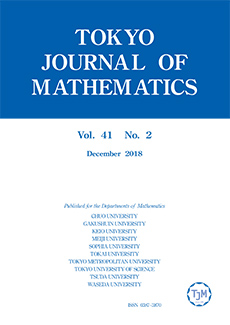Abstract
Consider a moduli space ${{\cal M}(\Sigma,d)}$ of reduced curves in ${\textbf{CP}^2}$ with a given degree ${d}$ and having a prescribed configuration of singularities ${\Sigma}$. Let ${C,C'\in {\cal M}(\Sigma,d)}$. The pair of curves ${(C,C')}$ is called a weak Zariski pair if the pairs of spaces ${(\textbf{CP}^2,C)}$ and ${(\textbf{CP}^2,C')}$ are not homeomorphic. There exists two classical ways to detect weak Zariski pairs: (i) showing that the generic Alexander polynomials ${\Delta_C(t)}$ and ${\Delta_{C'}(t)}$ of~${C}$ and ${C'}$ are different; (ii) showing that the fundamental groups ${\pi_1(\textbf{CP}^2-C)}$ and ${\pi_1(\textbf{CP}^2-C')}$ are not isomorphic. In this paper, we give the first example of a weak Zariski pair ${(C,C')}$ such that ${\pi_1(\textbf{CP}^2-C)}$ and ${\pi_1(\textbf{CP}^2-C')}$ are isomorphic (notice that such an isomorphism automatically implies ${\Delta_C(t)} = {\Delta_{C'}(t)}$). We shall call such a pair a ${\pi_1}$-equivalent weak Zariski pair. The members ${C}$ and ${C'}$ of our pair are reducible sextics with the following configuration of singularities ${\{D_{10}+A_5+A_4\}}$. By the way, we determine the fundamental group ${\pi_1(\textbf{CP}^2-D)}$ for any curve~${D}$ in the moduli space ${{\cal M}(\{D_{10}+A_5+A_4\},6)}$. As an application, we give a new weak Zariski ${4}$-ple (we recall that a ${4}$-ple ${(D_1,D_2,D_3,D_4)}$ of curves in ${{\cal M}(\Sigma,d)}$ is called a weak Zariski ${4}$-ple if for any ${1\leq i<j\leq 4}$ the pairs of spaces ${(\textbf{CP}^2,D_i)}$ and ${(\textbf{CP}^2,D_j)}$ are not homeomorphic).
Citation
Christophe EYRAL. Mutsuo OKA. "$\pi_1$-Equivalent Weak Zariski Pairs." Tokyo J. Math. 28 (2) 499 - 526, December 2005. https://doi.org/10.3836/tjm/1244208204
Information





